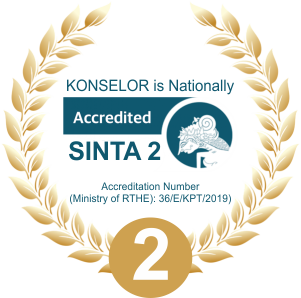Development of guidelines reality group counseling-based on cyber counseling to increase student adversity quotient
 ), Dayana Adrela Bait(4),
), Dayana Adrela Bait(4), (1) Institut Agama Kristen Negeri (IAKN) Kupang
(2) Institut Agama Kristen Negeri (IAKN) Kupang
(3) Institut Agama Kristen Negeri Kupang
(4) Institut Agama Kristen Negeri Kupang
 Corresponding Author
Corresponding Author
Copyright (c) 2023 Joris Taneo, Erly Oviane Malelak, Maria Natalia Loban, Dayana Adrela Bait
DOI : https://doi.org/10.24036/02022114116561-0-00
Full Text:
 Language : en
Language : en
Abstract
Keywords
References
Ahyani, Latifah Nur. 2016. “Meningkatkan Adversity Quotient (Daya Juang) Pada Anak Anak Panti Asuhan Melalui Penguatan Sosial Support.” Jurnal Psikologi Perseptual.
Aminah. 2015. “PENGARUH DAYA JUANG, MANAJEMEN DIRI, DAN MOTIVASI BERPRESTASI, TERHADAP KINERJA PEGAWAI KEMENTERIAN AGAMA PROVINSI KALIMANTAN TIMUR.” Jurnal Psikostudia, Universitas Mulawarman 4(2).
Andyani, Adelina Ayu, and Rini Indryawati. 2018. “ADVERSITY QUOTIENT DAN PRESTASI AKADEMIK PADA SISWA SMA.” Jurnal Psikologi.
Corey, Gerald. 2012. Theory and Practice of Group Counseling. Australia; Belmont, CA: Thomson/Brooks/Cole.
Fitria, Nita. 2016. “Adversity Quotient Mahasiswa Fakultas Keperawatan Yang Sedang Mengikuti KBK Dengan Metode SCL.” Jurnal Ilmu Keperawatan.
Frimandani, D., & Widjajanti, D. 2018. "Improving adversity quotient (AQ) with discovery learning." International Converence on Mathematics and Sciene Education of Universitas Pendidikan Indonesia, 3: 79-84.
Ginting, Rafael Lisinus, and Radman Gulo. 2017. “Upaya Meningkatkan Sikap Positif Siswa Melalui Konseling Individu Dengan Teknik Realitas Di Kelas V SDN 075046 Lolofitu.” PSIKOLOGI KONSELING.
Ifdil, Ifdil, and Zadrian Ardi. 2013. “Konseling Online Sebagai Salah Satu Bentuk Pelayanan E-Konseling.” Jurnal Konseling Dan Pendidikan.
Inayatillah, Vafi. 2015. “Hubungan Antara Adversity Quotient Dengan Kecenderungan Stres Dalam Menyelesaikan Tugas Akhir (Penulisan Skripsi) Pada Mahasiswa”. Undergraduate thesis, UIN Sunan Ampel Surabaya.
Juwita, Hesti Ratna. 2020. “The Role of Adversity Quotient in the Field of Education: A Review of the Literature on Educational Development.” International Journal of Educational Methodology.
Nadhira, Ajeng Indy, and Ruseno Arjanggi. 2020. “HUBUNGAN ANTARA ADVERSITY QUOTIENT DAN STRES PADA ANGGOTA KEPOLISIAN DI POLRESTABES SEMARANG.” Proyeksi.
Nuralisa, A., Machmuroch, and S. Astriana. 2014. “Hubungan Antara Adversity Quotient Dan Dukungan Sosial Teman Sebaya Dengan Penyesuaian Diri Mahasiswa Perantauan Tahun Pertama Fakultas Teknik Universitas Sebelas Maret Surakarta.” 1–12.
Octavia, Evi, and Sumedi P. Nugraha. 2013. “Hubungan Antara Adversity Quotient Dan Work-Study Conflict Pada Mahasiswa Yang Bekerja.” Psikologi Integratif.
Pasmawati, Hermi. 2016. “Cyber Counseling Sebagai Metode Pengembangan Layanan Konseling Di Era Global.” 43–54.
Permatasari, Indah. 2019. “Efektivitas Konseling Kelompok Realitas Terhadap Peningkatan Disiplin Belajar Peserta Didik MTs Asy-Syafi’iyyah Jatibarang Brebes.” JCOSE Jurnal Bimbingan Dan Konseling.
Phoolka, S. &., and N. Kaur. 2012. “Adversity Quotient : A New Paradigm to Explore.” Journal of Contemporary Business Studies 67–78.
Prakaew, Unchalika., & Leesattrupai, Chanya. 2017. “The Effects of Adversity Quotient Development Program on Stress in Mutthayomsuksa 3 Students in Bangkok.” The Asian Conference on Psychology & the Behavioral Sciences 2017 Official Conference Proceedings.
Puspita, Dinda, Yessy Elita, and Rita Sinthia. 2020. “PENGARUH LAYANAN KONSELING KELOMPOK BERBASIS CYBER-COUNSELING VIA WHATSAPPTERHADAP KETERBUKAAN DIRI MAHASISWA BIMBINGAN DAN KONSELINGSEMESTER 4A UNIVERSITAS BENGKULU.” Consilia : Jurnal Ilmiah Bimbingan Dan Konseling.
Saidah, S., and L. Aulia. 2014. “HUBUNGAN SELF EFFICACY DENGAN ADVERSITY QUOTIENT (AQ).” Jurnal Psikologi II(2).
Saputri, W. Dessy. 2016. “Efektifitas Konseling Realitas untuk Meningkatkan Tanggung Jawab Siswa dalam Menyelesaikan Tugas.” Universitas Muhamadiyah Magelang: Skripsi.
Sugiyono. 2011. Metode Penelitian Kuantitatif, Kualitatif dan R&D. Bandung: Afabeta.
 Article Metrics
Article Metrics
 Abstract Views : 359 times
Abstract Views : 359 times
 PDF Downloaded : 97 times
PDF Downloaded : 97 times
Refbacks
- There are currently no refbacks.
Copyright (c) 2023 Joris Taneo, Erly Oviane Malelak, Maria Natalia Loban, Dayana Adrela Bait

This work is licensed under a Creative Commons Attribution 4.0 International License.







